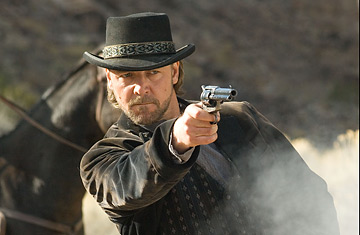
Russell Crowe stars as Ben Wade in 3:10 TO YUMA, directed by James Mangold.
Rancher Dan Evans (Christian Bale) may live in 19th century Arizona, but he's leading a 20th century — or sub-prime — sort of life. He's behind on his mortgage payments to the big landowner, who wants the property back in order to sell it on the Internet — oops, sorry, to the railroad. Dan's cattle herd is also dwindling, one of his kids is sick and the other thinks he's a coward. Even his patient wife is beginning to eye him dubiously. You really don't want to walk in Dan's shoes.
On the other hand, there's something very attractive about the boots worn by the notorious bandit and ironist, Ben Wade (Russell Crowe) — a dapper, literate, sexy guy who whiles away his idle moments drawing sketches in his ever-present notebook. We are drawn more to his insouciant spirit than we are to the earnest, hard-pressed (and well-played) Dan. When the rancher, desperately needing the $200 fee, signs on to escort the captured outlaw through hard country in order to catch the 3:10 to Yuma where a courthouse, a trial and, doubtless, a necktie party await Ben, we know where our moral interest is supposed to lie. But the road agent is a really cute and seductive guy, steadily luring Dan into reluctantly bonding with him.
Such is the power of charm to unhinge righteous principle. And such is the power of very solid genre filmmaking to disarm an audience's disbelief. Westerns, as we all know, are a disused movie form, and part of this film's appeal lies simply in returning us to the thrilling days of yesteryear, to the beauty of spare narrative played out in a stark landscape. 3:10 is, of course, a remake of the 1958 movie that starred Van Heflin and Glenn Ford, which was, in my opinion, not as good as a lot of people thought, mostly because the mumbly Ford could only play one note at a time, which meant he erred more toward likeability than toward menace. That's not a problem for Crowe, an actor with a teasing, hair-trigger temperament, who never settles for predictability when he's on screen and never lets us settle into complacency as we watch him.
Something similar might be said of James Mangold's direction. He's full of surprises, too — a discreetly sexy moment with a prostitute is a good example, as is a curiously menacing encounter with railroaders blasting their way through a mountainside. With his screenwriters (Michael Brandt and Derek Haas, updating Halstad Welles's original) he has managed the task of expanding what amounted to a kind of chamber piece without improbably inflating it. He never loses his crispness or his narrative efficiency.
I've seen one or two comparisons of 3:10 to Yuma with Unforgiven. These are not entirely apt. Mangold's offering lacks the blackness and absurdity of Clint Eastwood's great film. It is more in the vein of Anthony Mann's westerns of the 1950s — trim, efficiently paced, full of briskly stated conflicts that edge up to the dark side, but never fully embrace it. That's quite all right. 3:10 to Yuma reminds us that well-made westerns — precisely because they are such a ritualized and conventionalized form — have an ability to isolate moral conflicts in spare, essentially unrealistic, contexts and thus focus our undistracted attention on those issues. Who says remakes are always inferior to the original film? And who says the western is dead? Especially when a movie is as entertaining as this one, you begin to think this formerly beloved genre is due for a revival.
